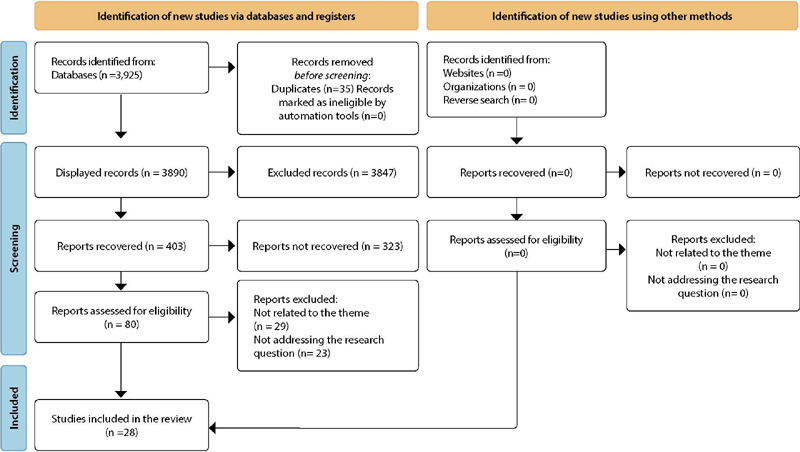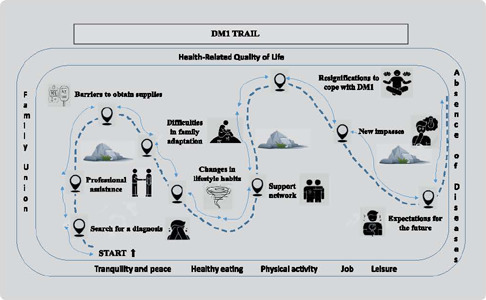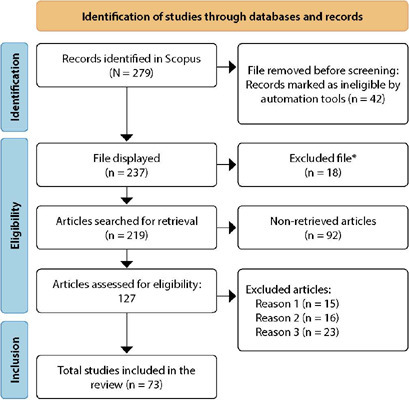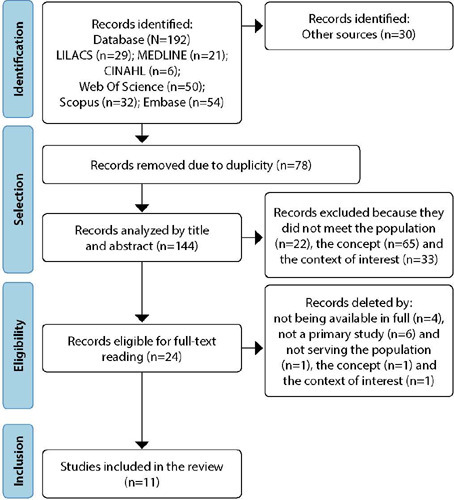-
RESEARCH01-01-2016
Nurses’ performance on indigenous and African-Brazilian health care practices
Revista Brasileira de Enfermagem. 2016;69(5):840-846
Abstract
RESEARCHNurses’ performance on indigenous and African-Brazilian health care practices
Revista Brasileira de Enfermagem. 2016;69(5):840-846
DOI 10.1590/0034-7167.2016690504
Views0See moreABSTRACT
Objective:
to analyze the performance of nurses from the Estratégia Saúde da Família (Family Health Strategy) on health care practices rooted in African and Indigenous cultures.
Methods:
Thematic Oral History was used and interviews were conducted with seven participants, who worked with Primary Health Care in Northeastern Brazil. The analysis was based on Leininger’s Theory of Cultural Care and the intercultural concept of human rights, among others.
Results:
nurses are unaware of the religious and historical context of the ethnic groups cared for and do not appreciate their self-care practices in areas with a predominance of African and indigenous cultures. These practices coexist with the hegemonic biomedical model.
Conclusion:
the debate on cultural competence in the context of professional qualification and exercise is required, aiming to promote the nursing work in the perspective of diversity and comprehensiveness of health care.
-
RESEARCH01-01-2016
Accessibility assessment of assistive technology for the hearing impaired
Revista Brasileira de Enfermagem. 2016;69(5):833-839
Abstract
RESEARCHAccessibility assessment of assistive technology for the hearing impaired
Revista Brasileira de Enfermagem. 2016;69(5):833-839
DOI 10.1590/0034-7167.2016690503
Views0ABSTRACT
Objective:
to assess the automatic accessibility of assistive technology in online courses for the hearing impaired.
Method:
evaluation study guided by the Assessment and Maintenance step proposed in the Model of Development of Digital Educational Material. The software Assessor and Simulator for the Accessibility of Sites (ASES) was used to analyze the online course “Education on Sexual and Reproductive Health: the use of condoms” according to the accessibility standards of national and international websites.
Results:
an error report generated by the program identified, in each didactic module, one error and two warnings related to two international principles and six warnings involved with six national recommendations. The warnings relevant to hearing-impaired people were corrected, and the course was considered accessible by automatic assessment.
Conclusion:
we concluded that the pages of the course were considered, by the software used, appropriate to the standards of web accessibility.
Keywords:Digital ExclusionDistance EducationInternetPeople with Hearing DisabilitiesSelf-help EquipmentSee more -
RESEARCH01-01-2016
Functional disability: health conditions and physical activity practice in older adults
Revista Brasileira de Enfermagem. 2016;69(5):825-832
Abstract
RESEARCHFunctional disability: health conditions and physical activity practice in older adults
Revista Brasileira de Enfermagem. 2016;69(5):825-832
DOI 10.1590/0034-7167.2016690502
Views0See moreABSTRACT
Objective:
to verify the prevalence of functional disability among older adults and how it can affect their health conditions and the regular practice of physical activities.
Method:
this is a household and cross-sectional study conducted with older adults of both sexes. We verified the variables associated with functional disability by Poisson’s regression.
Results:
around 420 older adults participated in this study (68.1% of them being women). We observed a statistically significant association between functional disability, the number of chronic diseases, self-assessed health conditions, and the practice of physical activities; the latter only being found among men. Older adults who reported presenting four or more chronic diseases, self-assessed their health conditions as poor, and were not used to practice physical activities, showing high prevalence of functional disability.
Conclusion:
considering the changeable character of these variables, we recommend that prevention actions be taken, mainly at primary level, to delay the emergence of disability.
-
RESEARCH01-01-2016
Organizational culture of a psychiatric hospital and resilience of nursing workers
Revista Brasileira de Enfermagem. 2016;69(5):817-824
Abstract
RESEARCHOrganizational culture of a psychiatric hospital and resilience of nursing workers
Revista Brasileira de Enfermagem. 2016;69(5):817-824
DOI 10.1590/0034-7167.2016690501
Views0ABSTRACT
Objective:
to analyze the organizational culture of a psychiatric hospital and identify the capacity of resilience of nursing workers.
Method:
quantitative research. For data collection, were used the Brazilian Instrument for Evaluation of Organizational Culture (IBACO – Instrumento Brasileiro para Avaliação da Cultura Organizacional) and the Resilience Scale (RS).
Results:
participants reported the existence of centralization of power and devaluation of workers, despite recognizing the existence of collaboration at work and practices for improving interpersonal relations. In relation to the capacity of resilience, 50% of workers showed high level, and 42.9% a medium level of resilience. The correlation tests revealed negative values between the IBACO and RS domains, indicating that the lower the appreciation of individuals in the institution, the greater their capacity of resilience.
Conclusion:
the organizational values reflect the work organization model in the institution that devalues the workers’ needs and requires greater capacity of resilience.
Keywords:Hospital AdministrationNursingOrganizational CulturePsychological ResilienceWorkers' HealthSee more -
EDITORIAL01-01-2016
Making our nursing research matter
Revista Brasileira de Enfermagem. 2016;69(5):813-814
Abstract
EDITORIALMaking our nursing research matter
Revista Brasileira de Enfermagem. 2016;69(5):813-814
DOI 10.1590/0034-7167-2015-0156
Views0Nurses worldwide are being increasingly exposed to new and interesting research methodologies. At the same time, they are feeling considerable pressure to ensure that the studies they propose are sufficiently methodologically rigorous to pass the scrutiny of review for funding or publication. In this context, it is increasingly important to remind ourselves that methodological rigor […]See more -
EDITORIAL01-01-2016
Fazendo nossa pesquisa em enfermagem ser relevante
Revista Brasileira de Enfermagem. 2016;69(5):813-814
Abstract
EDITORIALFazendo nossa pesquisa em enfermagem ser relevante
Revista Brasileira de Enfermagem. 2016;69(5):813-814
DOI 10.1590/0034-7167-2015-0156
Views0Enfermeiros em todo o mundo estão cada vez mais expostos a metodologias de pesquisa novas e interessantes. Ao mesmo tempo, sentem uma pressão considerável para assegurar que os estudos a que se propõem são suficientemente rigorosos metodologicamente para passar pelo crivo de avaliação para fomento ou publicação. Nesse contexto, é cada vez mais importante lembrarmos […]See more -
REVIEW01-01-2016
O Espiritismo como terapia no cuidado em saúde na epilepsia
Revista Brasileira de Enfermagem. 2016;69(4):804-810
Abstract
REVIEWO Espiritismo como terapia no cuidado em saúde na epilepsia
Revista Brasileira de Enfermagem. 2016;69(4):804-810
DOI 10.1590/0034-7167.2016690425i
Views0See moreRESUMEN
Objetivo:
presentar una breve historia del Espiritismo, la visión de la epilepsia por el Espiritismo, y el potencial de la espiritualidade y religiosidad como tratamientos complementarios y coadyuvantes de la epilepsia.
Método:
esta es una breve revisión del impacto de la fe, la espiritualidad y religiosidad, en particular la filosofía espiritual como tratamiento complementario de los trastornos neurológicos (centrada especialmente en la epilepsia) y la salud mental. Para esto, se realizó una revisión de la religiosidad/espiritualidad y la epilepsia en la base de datos PubMed y SciELO.
Conclusión:
el ejercicio de la espiritualidad y la religiosidad puede ser una estrategia de afrontamiento y tratamiento positivo para apoyar la terapia tradicional de los pacientes con epilepsia y otros trastornos neurológicos. Sin embargo, es necesario desmitificar muchas creencias sobre la epilepsia así como mejorar el conocimiento sobre este importante aspecto de la dimensión de salud entre profesionales, cuidadores y pacientes para explorar su potencial para el tratamiento y el apoyo.
-
REVIEW01-01-2016
The Spiritism as therapy in the health care in the epilepsy
Revista Brasileira de Enfermagem. 2016;69(4):804-810
Abstract
REVIEWThe Spiritism as therapy in the health care in the epilepsy
Revista Brasileira de Enfermagem. 2016;69(4):804-810
DOI 10.1590/0034-7167.2016690425i
Views0See moreABSTRACT
Objective:
to present a brief history of Spiritism, the vision of epilepsy by Spiritism, and the potential of spirituality and religiosity care as complementary and coadjutants treatments in epilepsy.
Method:
this is a brief review about the impact of faith, spirituality, and religiosity, particularly the Spiritism philosophy as complementary treatment to neurological disorders (particularly focusing on epilepsy) and mental health. We conduct a review of published articles (about religion/spirituality and epilepsy) in the Pubmed and SciELO databases.
Conclusion:
the exercise of spirituality and religiosity can be a positive coping strategy to support the traditional therapy of patients with epilepsy and other neurological disorders. However, it is necessary to demystify myths and beliefs about the epilepsy and improve knowledge about this important health dimension among professionals, patients, and caregivers to explore their full treatment and supportive potential.
-
EDITORIAL03-08-2024
A enfermagem como protagonista no enfrentamento da hesitação e recusa vacinal
Revista Brasileira de Enfermagem. 2024;77:e77suppl101
Abstract
EDITORIALA enfermagem como protagonista no enfrentamento da hesitação e recusa vacinal
Revista Brasileira de Enfermagem. 2024;77:e77suppl101
DOI 10.1590/0034-7167.202477suppl101pt
Views0Desde a década de 1970, o Ministério da Saúde do Brasil instituiu o Programa Nacional de Imunização (PNI), que precedeu o Sistema Único de Saúde e que lhe foi incorporado e fortalecido, devido ao modelo descentralizado aos municípios, mas de comando único ao nível central. Seu objetivo era e ainda é coordenar as ações de […]See more -
EDITORIAL03-08-2024
Nursing as a player in tackling vaccine hesitancy and refusal
Revista Brasileira de Enfermagem. 2024;77:e77suppl101
Abstract
EDITORIALNursing as a player in tackling vaccine hesitancy and refusal
Revista Brasileira de Enfermagem. 2024;77:e77suppl101
DOI 10.1590/0034-7167.202477suppl101
Views1Since the 1970s, the Brazilian Ministry of Health established the Brazilian National Immunization Program (PNI – Programa Nacional de Imunização), which preceded the Brazilian Health System and which was incorporated and strengthened due to the decentralized model to municipalities, but under single command at central level. Its objective was and still is to coordinate vaccination […]See more -
EDITORIAL02-26-2024
Enfermeiro Navegador de Pacientes com Câncer: contribuições para a discussão no cenário nacional
Revista Brasileira de Enfermagem. 2024;77(2):e770201
Abstract
EDITORIALEnfermeiro Navegador de Pacientes com Câncer: contribuições para a discussão no cenário nacional
Revista Brasileira de Enfermagem. 2024;77(2):e770201
DOI 10.1590/0034-7167.2024770201pt
Views0A prática profissional da navegação de pacientes é algo incipiente no Brasil e, sendo assim, é indispensável uma ampla discussão com vários setores da sociedade, sendo essa a principal propositura deste editorial. Comecemos pela história.A navegação de pacientes foi definida em 1989 como uma intervenção de prestação de serviços baseada na comunidade, com o objetivo […]See more -
EDITORIAL02-26-2024
Nurse Navigator of Cancer Patients: contributions to the discussion on the national stage
Revista Brasileira de Enfermagem. 2024;77(2):e770201
Abstract
EDITORIALNurse Navigator of Cancer Patients: contributions to the discussion on the national stage
Revista Brasileira de Enfermagem. 2024;77(2):e770201
DOI 10.1590/0034-7167.2024770201
Views0The professional practice of patient navigation is incipient in Brazil and, therefore, a broad discussion with various sectors of society is essential, which is the main purpose of this editorial. Shall we start with the story.Patient navigation was defined in 1989 as a community-based service delivery intervention aimed at appropriately promoting access to diagnosis and […]See more -
ERRATUM02-26-2024
ERRATUM
Revista Brasileira de Enfermagem. 2024;77(1):e2024n1e02
Abstract
ERRATUMERRATUM
Revista Brasileira de Enfermagem. 2024;77(1):e2024n1e02
DOI 10.1590/0034-7167.20247701e02
Views0In the article “Active teaching model to promote critical thinking”, with DOI number: , published in Revista Brasileira de Enfermagem, 2019;72(1):293-8, on page 297:Include before REFERENCES:[…]See more -
REVIEW02-26-2024
Practice of immersion in hot water to relieve pain in neonatology: an integrative review
Revista Brasileira de Enfermagem. 2024;77(1):e20230260
Abstract
REVIEWPractice of immersion in hot water to relieve pain in neonatology: an integrative review
Revista Brasileira de Enfermagem. 2024;77(1):e20230260
DOI 10.1590/0034-7167-2023-0260
Views0See moreABSTRACT
Objectives:
to identify immersion use in hot water to relieve pain in newborns.
Methods:
an integrative literature review, carried out in the PubMed, VHL, EMBASE, Scopus, CINAHL, Cochrane and SciELO databases, with investigations in English, Spanish, French or Portuguese, published between 2002 and 2022. The Health Sciences Descriptors (DeCS) and Medical Subject Headings (MeSH) were used to answer the following question: what are the uses of hot water immersion in relieving pain in newborns?
Results:
nine studies were included, mainly Brazilian, experimental, with a predominance of strong and moderate levels of evidence. Hydrotherapy and bath use (immersion and bandaging) was observed, promising interventions in reducing pain scores, assessed using scales, physiological and endocrine parameters.
Conclusions:
hot water proved to be a promising non-pharmacological intervention in relieving pain in infants in different contexts.

-
ORIGINAL ARTICLE02-26-2024
Artificial intelligence to predict bed bath time in Intensive Care Units
Revista Brasileira de Enfermagem. 2024;77(1):e20230201
Abstract
ORIGINAL ARTICLEArtificial intelligence to predict bed bath time in Intensive Care Units
Revista Brasileira de Enfermagem. 2024;77(1):e20230201
DOI 10.1590/0034-7167-2023-0201
Views0See moreABSTRACT
Objectives:
to assess the predictive performance of different artificial intelligence algorithms to estimate bed bath execution time in critically ill patients.
Methods:
a methodological study, which used artificial intelligence algorithms to predict bed bath time in critically ill patients. The results of multiple regression models, multilayer perceptron neural networks and radial basis function, decision tree and random forest were analyzed.
Results:
among the models assessed, the neural network model with a radial basis function, containing 13 neurons in the hidden layer, presented the best predictive performance to estimate the bed bath execution time. In data validation, the squared correlation between the predicted values and the original values was 62.3%.
Conclusions:
the neural network model with radial basis function showed better predictive performance to estimate bed bath execution time in critically ill patients.
-
REVIEW02-26-2024
Evidence of intrauterine device insertion by nurses in Primary Health Care: an integrative review
Revista Brasileira de Enfermagem. 2024;77(1):e20230134
Abstract
REVIEWEvidence of intrauterine device insertion by nurses in Primary Health Care: an integrative review
Revista Brasileira de Enfermagem. 2024;77(1):e20230134
DOI 10.1590/0034-7167-2023-0134
Views0ABSTRACT
Objectives:
to synthesize and analyze evidence on intrauterine device insertion by nurses in Primary Health Care.
Methods:
an integrative review, carried out in the BDENF, CINAHL, LILACS, SciELO, Scopus, PubMed and Web of Science databases in June 2022, delimiting the period from 1960 to 2022.
Results:
141 articles were identified in the initial search, and 10 studies made up the final sample. Four (40%) were developed in the United States and one (10%) in Brazil, with publications from 1979 to 2021. The findings were grouped into three categories: Nurse training to insert an intrauterine device; Nurses’ competency to insert an intrauterine device; and Women’s access to intrauterine devices.
Conclusions:
nurse theoretical and practical training is a prominent element, consolidated in the favorable outcomes of insertions performed by nurses and satisfaction among women, a practice that has expanded access to the contraceptive method in Primary Health Care.
Keywords:Advanced Practice NursingIntrauterine DevicesLong-Acting Reversible ContraceptionNursesPrimary Health CareSee more
-
ORIGINAL ARTICLE06-14-2024
Mid-range theory of the nursing diagnosis Overweight
Revista Brasileira de Enfermagem. 2024;77(2):e20230372
Abstract
ORIGINAL ARTICLEMid-range theory of the nursing diagnosis Overweight
Revista Brasileira de Enfermagem. 2024;77(2):e20230372
DOI 10.1590/0034-7167-2023-0372
Views0See moreABSTRACT
Objective:
To build a mid-range theory for the nursing diagnosis Overweight in adolescents and young adults.
Methods:
A methodological study in the light of the theoretical frameworks of Roy and of Lopes, Silva and Herdman. A total of 3,925 articles were retrieved and assessed using the State of the Art Through Systematic Review software. The final sample consisted of 28 articles.
Results:
The findings converged to 3 essential attributes, 13 antecedents, and 7 consequences. A mid-range theory was built consisting of an illustrated diagram, 11 propositions, and 12 causal relationships.
Final considerations:
From the creation of the theory, it was possible to better understand the nursing diagnosis Overweight within the context of adolescents and young adults. Understanding nursing phenomena contributes to nursing science’s advancement and strengthening.

-
ORIGINAL ARTICLE06-14-2024
Cardiovascular Risk and Lifestyle: comparison between teaching workers in Portugal and Brazil
Revista Brasileira de Enfermagem. 2024;77(2):e20230354
Abstract
ORIGINAL ARTICLECardiovascular Risk and Lifestyle: comparison between teaching workers in Portugal and Brazil
Revista Brasileira de Enfermagem. 2024;77(2):e20230354
DOI 10.1590/0034-7167-2023-0354
Views0ABSTRACT
Objective:
Compare Cardiovascular Risk between workers in Brazil and Portugal who work in the teaching context and its relationship with Lifestyle and Common Mental Disorder.
Methods:
Cross-sectional study that compared the cardiovascular health conditions of teaching workers in Manaus (Brazil) and Coimbra (Portugal). The odds ratio between groups was estimated.
Results:
The differences were: Smoking and hypercholesterolemia in participants from Portugal. Hypertension, chronic disease, increased abdominal perimeter, common mental disorder, and absence from work in Brazil. The variables with the greatest effect for high cardiovascular risk were: Country-Portugal [17.273 (95%CI1.538-193.951)], sex-male [61.577 (95%CI5.398-702.469)] and smoking [593.398 (95%CI57.330-6.142.020)].
Conclusion:
The differences in risk between groups showed that participants from Portugal, men, with high blood pressure and/or smokers are the most vulnerable to having a cardiovascular event. There is a need for interventions to promote cardiovascular health in the workplace in both countries.
Keywords:Community-Based Participatory ResearchHeart Disease Risk FactorsLife StyleOccupational HealthUniversitiesSee more -
ORIGINAL ARTICLE06-14-2024
Functional performance assessment scale for children and adolescents with cancer: cross-cultural study
Revista Brasileira de Enfermagem. 2024;77(2):e20230331
Abstract
ORIGINAL ARTICLEFunctional performance assessment scale for children and adolescents with cancer: cross-cultural study
Revista Brasileira de Enfermagem. 2024;77(2):e20230331
DOI 10.1590/0034-7167-2023-0331
Views0ABSTRACT
Objectives:
to describe the methodological process of cross-cultural adaptation of the PlayPerformance Scale for Children to Brazilian Portuguese.
Methods:
methodological study of translation and cross-cultural adaptation in six stages: translation, synthesis of translations, back-translation, evaluation by a committee of judges, evaluation by expert nurses, and pretest. The agreement and representativeness of the items were assessed using the content validity index. A minimum value of 80% agreement was considered.
Results:
all stages of the translation and cross-cultural adaptation process were satisfactory. In the evaluation performed by the committee of judges, all items obtained agreement above 80%. Fifteen pediatric nurses conducted the content validation, suggesting necessary modifications for understanding and application. Thirty children and adolescents with cancer were assessed with the scale for the pre-test.
Conclusions:
the scale was cross-culturally adapted to Brazilian Portuguese. The need for psychometric testing in a consistent sample is emphasized.
Keywords:Cross-Cultural ComparisonNursing Methodology ResearchOncologyPediatric NursingPhysical Functional PerformanceSee more -
ORIGINAL ARTICLE06-14-2024
Meanings attributed to health-related quality of life by caregivers of adolescents with diabetes
Revista Brasileira de Enfermagem. 2024;77(2):e20230314
Abstract
ORIGINAL ARTICLEMeanings attributed to health-related quality of life by caregivers of adolescents with diabetes
Revista Brasileira de Enfermagem. 2024;77(2):e20230314
DOI 10.1590/0034-7167-2023-0314
Views0See moreABSTRACT
Objective:
to interpret the meanings attributed to the health-related quality of life by caregivers of adolescents with type 1 diabetes mellitus.
Methods:
qualitative, descriptive-exploratory study of 14 caregivers of adolescents with diabetes developed at the reference outpatient clinic for endocrine diseases in a city in the state of Paraíba. Interviews were performed between May and September 2021. Inductive thematic analysis of the empirical material, and its interpretation in light of the concepts of health-related quality of life and family functioning were performed.
Results:
the meanings attributed by caregivers to the health-related quality of life of adolescents converged on the feeling of being healthy, healthy eating, satisfactory family income, family involvement in care and effective access to the care network.
Final Considerations:
knowledge of these meanings enables health professionals to develop strategies that meet the unique demands of caregivers experiencing this diagnosis.

-
REVIEW06-14-2024
Critical analysis of the scientific production on Jean Watson’s Theory of Human Care
Revista Brasileira de Enfermagem. 2024;77(2):e20230231
Abstract
REVIEWCritical analysis of the scientific production on Jean Watson’s Theory of Human Care
Revista Brasileira de Enfermagem. 2024;77(2):e20230231
DOI 10.1590/0034-7167-2023-0231
Views0See moreABSTRACT
Objectives:
to analyze current scientific production on the use of the theoretical-methodological precepts of Jean Watson’s Theory of Human Care/Clinical Caritas Process.
Methods:
quantitative, exploratory, descriptive study using data from 1979 to 2023 in the Scopus database. Analysis was carried out using VOSviewer software.
Results:
the 73 studies included establish a network of collaboration among 221 authors from 155 institutions in 18 countries, who discuss the development of ethical behavior in nursing staff, through technical improvement, implementation, and validation of instrumental strategies capable of measuring and evaluating the quality of holistic and empathetic care. The Theory of Human Caring contributes to nursing training and care, and Process Clinical Caritas-Veritas is useful for the different possibilities of practice and education.
Conclusions:
it is important to strengthen with more empirical data a nursing work model centered on individual human care, supporting the evolution of scientific nursing knowledge.

-
REVIEW06-14-2024
Primary health care professionals’ practice in the face of leprosy: a scoping review
Revista Brasileira de Enfermagem. 2024;77(2):e20230207
Abstract
REVIEWPrimary health care professionals’ practice in the face of leprosy: a scoping review
Revista Brasileira de Enfermagem. 2024;77(2):e20230207
DOI 10.1590/0034-7167-2023-0207
Views0See moreABSTRACT
Objectives:
to identify Primary Health Care professionals’ practice in the face of leprosy.
Methods:
a scoping review, carried out between November 2022 and January 2023, conducted according to the methodological structure proposed by JBI and checklist Preferred Reporting Items for Systematic Reviews and Meta-Analyses extension for Scoping Reviews in six databases and additional literature.
Results:
the sample consisted of 11 articles, published between 2008 and 2022. The findings were synthesized into three categories: Early diagnosis and timely treatment; Physical disability prevention; and Household and social contact surveillance.
Final Considerations:
there is a need to align the practices carried out with those recommended by the Brazilian National Program for Leprosy Control and Elimination, as some were not identified in studies, which implies losses to qualified assistance directed to patient demands, with a view to control and elimination of leprosy.

-
ORIGINAL ARTICLE06-14-2024
Validity of the TBApp mobile application for self-care management for people with tuberculosis
Revista Brasileira de Enfermagem. 2024;77(2):e20230195
Abstract
ORIGINAL ARTICLEValidity of the TBApp mobile application for self-care management for people with tuberculosis
Revista Brasileira de Enfermagem. 2024;77(2):e20230195
DOI 10.1590/0034-7167-2023-0195
Views1See moreABSTRACT
Objectives:
to describe the validity process of the TBApp mobile application for self-care management for people with tuberculosis linked to Primary Health Care.
Methods:
methodological research developed with ten expert judges, carried out virtually. The application was assessed in relation to content and technology quality in seven domains (objectivity; structure and appearance; relevance; functionality; reliability; usability; and efficiency), using an instrument with a Likert scale.
Results:
TBApp was considered valid, relevant, functional, reliable and effective by expert judges. The objectives, structure and presentation and relevance domains presented an overall Content Validity Index of 0.93, and the functionality, reliability, usability and efficiency domains presented characteristics and sub-characteristics values greater than 0.80.
Conclusions:
TBApp is a creative and innovative tool that can be used by people with TB and disseminated in the scientific community.
Search
Search in:
Nuvem de Tags
Aged (144) Atenção Primária à Saúde (239) COVID-19 (104) Cuidados de Enfermagem (269) Educação em Enfermagem (151) Educação em Saúde (139) Enfermagem (930) Estudos de Validação (131) Health Education (144) Idoso (208) Mental Health (149) Nursing (987) Nursing Care (306) Patient Safety (151) Primary Health Care (284) Qualidade de Vida (104) Quality of Life (106) Saúde Mental (145) Segurança do Paciente (150) Validation Studies (108)



